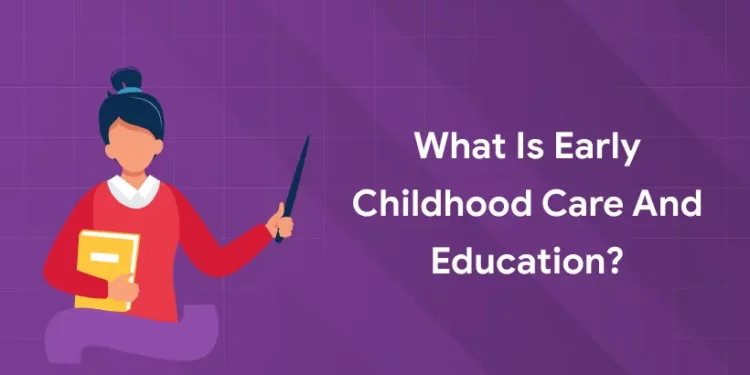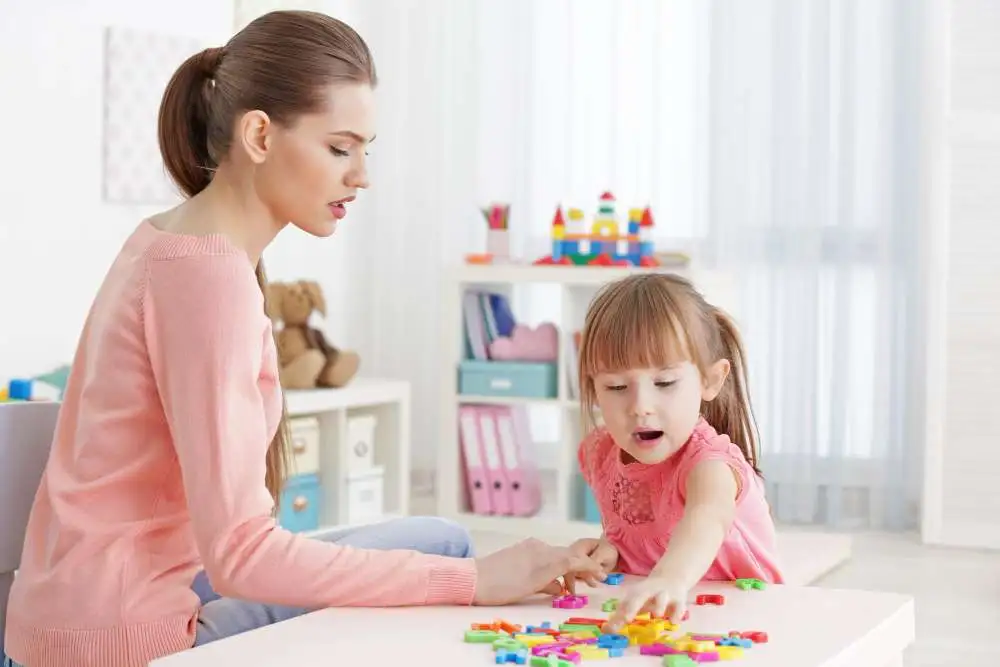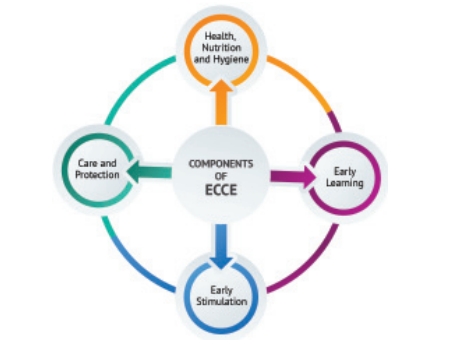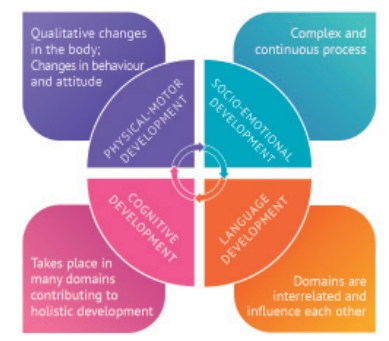Table of Contents
Early childhood is a critical period for a child’s development. The first few years of life are the foundation upon which future learning, behavior and health are built. Early Childhood Care and Education (ECCE) encompasses a wide range of activities and educational programs that contribute to a child’s growth in the formative years, from birth to eight years old. In India as more parents and educators realize the importance of these early years ECCE has become the focus for giving children a good start in life.
This blog post will explore the benefits of Early Childhood Care and Education (ECCE) and why teachers and parents need to prioritize it. We will also see how structured learning through programs can empower teachers and parents to support children’s development better.
Unlock your passion for education and shape young minds as a Montessori teacher!
What is Early Childhood Care and Education (ECCE)?
Early Childhood Care and Education (ECCE) is a holistic approach that combines health care, early learning and development for children in their early years. It is about providing a nurturing environment where children can grow physically, socially, emotionally and cognitively. ECCE is not just about academic learning but also includes emotional well being, language development, social skills and creativity and imagination.
ECCE is designed to:
- Support early brain development.
- Encourage social skills and emotional growth.
- Enhance cognitive development and problem solving skills.
- Give children a head start in school.
- Foster positive behavior and emotional regulation.
It involves play based learning where children engage in activities that promote exploration, experimentation and interaction with their peers.
Components of ECCE
1: What is the primary focus of the first plane of development in the Montessori method?
The question ‘What is Early Childhood Care and Education?’ cannot be fully answered without discussing the various components that comprise the ECCE. ECCE is an integrated program made up of many elements that work together to support children’s growth and welfare. So let us discuss the components of ECCE to have a comprehensive idea about ‘what is Early Childhood Care and Education?’.
Nutrition, Health and Hygiene
Giving the mother and the child standard medical care is the target of this element. This consists of providing the mother-to-be with antenatal and postnatal care, including proper nutrition, immunization, check-ups, a stress-free environment and safe delivery at a hospital or clinic.
Similarly, all children deserve a healthy environment – a nutritious diet, protection from disease, vaccines and healthcare.
Care and Protection
Every child needs that safe cocoon to be nurtured in so they can blossom to their absolute fullest potential possible. And that encompasses both physical and mental safety. Providing an environment of care and safety is fundamental to early care. Parents need to satisfy their children’s psychological and socioemotional needs. Yes, by meeting their needs and offering a secure and healthy context for their development, but also offering appropriate stimulation and warm, supportive interaction.
Early Stimulation
The domains of language, cognitive, social-emotional, and physical-motor development are all interrelated. All areas of development see tremendous growth and development in the first few years of life. Early stimulation is the process of giving young children the right stimuli to see, hear, touch, smell, and taste, especially in the first three years of life. The purpose of stimulation is to foster children’s potential by promoting opportunities for exploration of their surroundings and pleasant interactions with parents or other caregivers.
Studies confirm that brain development is aided by stimulation through the formation of neural networks that facilitate learning in later life. Therefore, young children must have access to a stimulating environment full of a range of developmentally appropriate materials, experiences, and opportunities during their formative years.
Early Learning
Another crucial element of ECCE is offering early learning opportunities. It is imperative that learning experiences for children between the ages of three and six are tailored to their developmental stage and age-appropriate. Assuring that children have access to a high-quality education that includes play, hands-on learning, observation, manipulation, and experimentation is vital. They gain knowledge about the world, other people, and themselves as a result.
Get Certified & Start Your Montessori Career
Montessori Teacher Training Course by Entri App: Gain expert skills, earn certification, and kickstart your teaching career.
Join Now!Various Forms of Development
You should have an idea about various types of developments to fully understand ‘what is Early Childhood Care and Education?’. Let us discuss various types of development before discussing further ‘What is Early Childhood Care and Education?’.
Physical – Motor Development
Physical development and growth encompass changes in body weight, height, and proportions. Bone development is a part of it.
The size, density, and proportion of the bones determine the overall body’s structure. They give the body an overall structure and form. The process of developing fine and gross muscles as well as hand-eye coordination is included in physical and motor development. Children benefit from the development of their gross muscles when they are crawling, walking, running, cycling, climbing, jumping, and other activities. Their ability to use fine motor skills is beneficial for writing, threading, colouring, scribbling, holding a crayon, and sketching.
Socio-emotional Development
The process of acquiring cultural values and societal norms is known as social development. Children who have healthy social development can build wholesome relationships with their family, friends, and other adults. The term “emotional development” describes how children’s emotions and sentiments develop. Basic emotions like love, fear, anger, and happiness are present in newborns. Over time, they acquire complicated emotions as well as the capacity to identify, communicate, and regulate them.
Cognitive Development
It describes the growth of mental or cognitive capacities, including the ability to reason, remember, identify, classify, visualize, and make judgments.
Language Development
It is the act of learning, comprehending, and applying language. It involves the ability to read, write, talk, and listen. These abilities aid kids in expressing their emotions and interacting with others.
Unlock your passion for education and shape young minds as a Montessori teacher!
Objectives of ECCE
The mission of ECCE is to support every child’s holistic development during their formative years by offering high-quality care and educational opportunities. The 2013 National ECCE Curriculum Framework outlines the goals of ECCE. Let us examine the main goals of ECCE in the context of this document. The objective of the Early Childhood Care and Education is to do the following things.
- Ensure the safety, security, acceptance, and respect of children.
- Ensure that children eat a healthy, balanced diet.
- Teach kids self-help techniques, good hygiene habits, and regular exercise.
- Facilitate the growth of clear language and effective communication and expression abilities.
- Guarantee that children’s physical and motor development reaches its full potential.
- Provide exciting, interactive, and engaging activities to help youngsters develop their sensory and cognitive abilities.
- Encourage the growth of social competence and pro-social skills in addition to the emotional health of youngsters
- Prepare children for formal education in schools.
Methods of ECCE
The characteristics of children in the age range of 4-6 are taken into consideration by ECE. It employs the play way method, which entails the following tasks:
- Music and rhythmic exercises
- Storytelling
- Language and cognitive activities with materials that can be manipulated, like play dough.
- Conversation
- Puppet play
- Indoor and outdoor games
- Dramatisation
- Nature walk
- Play (free and structured)
- Rhymes/songs
- Experiments at the child’s level such as water play, etc
- Doll’s play
Get Certified & Start Your Montessori Career
Montessori Teacher Training Course by Entri App: Gain expert skills, earn certification, and kickstart your teaching career.
Join Now!The Benefits of Early Childhood Care and Education
There are many benefits to the ECCE. Some of them are listed below.
- Research indicates that children who have received early childhood education perform well in primary school. ECCE promotes development and lets them benefit fully from schooling.
- ECCE promotes a child’s holistic development, including language, physical, emotional, and social skills.
- ECCE prepares youngsters to learn formal reading, writing, and numerical skills.
- ECCE offers children concrete experiences. This helps kids build learning skills.
- Early childhood care and education (ECCE) helps children build confidence. This leads to more self-discipline.
- ECCE encourages children to participate in group activities.
- ECCE is not a results-oriented course of study. This approach prioritizes learning above the result.
- ECCE helps youngsters develop and strengthen their inherent talents and skills.
Unlock your passion for education and shape young minds as a Montessori teacher!
Significance of ECCE
There are many reasons for the significance of ECCE in India. Some important ones among them are listed below.
Educating First Generation Students
In our nation, a sizable portion of children are first-generation students. Children cannot receive enough care and direction if there is not an engaging and suitable learning environment at home. Children can be given a progressive and healthy environment for learning through ECCE. The growth of children from economically and educationally disadvantaged homes can be supported by ECCE.
Security for Children of Working Parents
Children’s sense of security and self-worth are strengthened by ECCE. The joint family system is rapidly crumbling. Consequently, there is no one else accessible to watch the kids for the parents, including the grandparents and other family members. Parents work long hours. The modern way of living has heightened mental stress. In this case, ECCE is not only a centre for education, but it also acts as a safe place where the parents can trust the caretakers and teachers to look after the children during their work hours.
Traditionally, parents are the first teachers and homes are the first schools. But in the present case scenario, as we discussed above, many parents’ lifestyles cannot afford the time to work on the early education of their child. All of these gaps can be filled if the child is enrolled in a good ECCE centre. So, it is essential to make ECCE centres easily accessible and affordable for all people.
Learning Through Playing
Play activities that are engaging and beneficial for education are one way that ECCE encourages children to learn.
Identifying and Meeting Health and Nutritional Requirements
If identified at this stage, it becomes simple to treat the majority of illnesses, weaknesses, and deficiencies in nutrition that children may experience. This is achievable via ECCE.
Educating the Girl Child
Girls are often prevented from attending school by their families because they must stay at home to care for their younger siblings. With the establishment of ECCE centres, girls enrolled in elementary school are free to attend their classes without the burden of looking after their siblings.
By promoting the education of girls, ECCE can have a significant impact on the universalization of education. Girls who participate in early childhood education programs are more likely to continue their education in elementary school. There is a higher enrollment and retention rate for kids with early childhood experiences.
Reduction of Child Labour and Child Marriage Rates
We discussed above that children have a higher chance of continuing being in school if they attend ECCE centres than the ones who do not. The higher enrolment and retention rates slowly lead to a reduction in child labour and child marriages, especially in rural settings.
Benefits for Parents and Teachers
- For Parents
- Preparation: Parents get to know about child development and parenting strategies.
- Peace of Mind – knowing that you have your kids in the best care during their formative years.
- Community – For parents to bond with other ECCE families.
- For Teachers
- Professional Development: Educators get to know child psychology, teaching methods and learning management.
- Job Satisfaction – you work with toddlers and have a gigantic effect on their futures.
- Career: Experienced teachers are sought after in Montessori schools and preschools throughout India.
Entri Montessori Course assist teachers obtain qualification and hands-on experience to deliver top-tier education and care to young learners.
Actionable Advice for Parents and Teachers
- Start Early
- Encourage early learning through reading, talking and playing with infants and toddlers.
- Introduce play-learn early!
- Be Involved in Learning
- Be part of your child’s learning journey by reading together, exploring outdoors and discussing new ideas.
- Post science videos or story books that engage.
- Create a Positive Learning Environment
- Ensure a safe, stimulating, and comfortable learning environment at home and in the classroom.
- Use age-relevant content to ignite inspiration.
- Encourage Social Interaction
- Arrange playdates and encourage your child to interact with peers in positive and cooperative ways.
- Role-playing and group play teach empathy, patience, and teamwork.
- Follow the Child’s Pace
- Let children explore at their own pace and provide opportunities for them to lead in learning activities.
- Respect their decisions and nudge them.
Key Takeaways
- Early Childhood Care and Education (ECCE) is for holistic development of a child in cognitive, social, emotional and physical areas.
- Montessori education is for self-directed learning, creativity and independence.
- ECCE programs equip children with skills for academic success, emotional resilience and positive social relationships.
- Teachers trained through Entri Montessori Course have the skills to provide quality education in early childhood.
- Parent involvement in ECCE reinforces the learning and what is taught in formal settings.
Conclusion
Investing in Early Childhood Care and Education (ECCE) is the best thing parents and teachers can do for the child’s future. Providing a safe, stimulating and nurturing environment during these early years ensures that children are prepared for lifelong learning, emotional well being and social success.
By applying Montessori principles which is child centered and respects individuality, parents and teachers can maximize a child’s potential. Through Entri Montessori Course, teachers get to gain skills to create positive early childhood experiences.
Together parents and teachers can create a supportive and enriching environment for children to grow and reach their full potential in life.
| Also Read | |
| 5 Ways Montessori Teacher Training Benefits Children | |
| Practical Life Tools Creation Project | |
| Montessori Pink Tower Making | |
| Knobbed Cylinders in Montessori | |
Get Certified & Start Your Montessori Career
Montessori Teacher Training Course by Entri App: Gain expert skills, earn certification, and kickstart your teaching career.
Join Now!Frequently Asked Questions
What is the Significance of play in ECCE?
The Playway method is mostly child-centred. It considers the unique needs, interests, and competencies of each kid. Children are naturally inclined to play. They cannot sit quietly anywhere, including the playground, home, and market. They start playing with anything they find, including pebbles, leaves, and other objects. They love to play and thoroughly engage in it.
Children can express themselves through play. Additionally, they can see and comprehend the world around them. It promotes socialization and healthy practices in youngsters. Play enhances a child’s overall growth. Play is a powerful tool for ECCE. Play-based learning ensures that a youngster retains what they have learned through it forever. Some point to stress the importance of the playway method of learning is given below.
- Play helps children develop their five senses. Play requires the use of senses and limbs.
- Play provides children with hands-on learning opportunities. The kid actively engages in the ‘Learning by Doing’ method.
- Play offers a balanced and process-oriented approach that meets all developmental objectives. It promotes children’s learning skills, including observation, experimenting, problem-solving, and creativity.
- Play promotes a balance between physical and intellectual interests.
- Play activities promote a child’s general growth, regardless of cultural background, while focusing on their interests and skills.
What is the role of the teacher in ECCE?
In ECCE, the instructor must adhere to the following guidelines:
- Have patience and tolerance.
- Love children as if they were your own, ensuring their safety and security even when they are not with their parents.
- Speak to the child and their parents in the mother tongue since language is a fundamental tool for preserving and advancing culture across generations. It works wonders to boost parents’ and kids’ confidence when they converse in their mother tongue.
- Employ a range of locally accessible resources to create an appropriate learning environment.
- Should have faith in the child’s aptitude and abilities and support them as they mature and learn to manage their own emotions.
- Give the child the freedom to solve problems on their own and allow them to develop at their speed.
- Call the kid by name to instil confidence in her/him and model appropriate conversational techniques for the child to hear.
- Respecting kids helps them become more confident in themselves.
- Use words as well as actions of encouragement.
- Accept the child for what they are.
- Make the child aware of their abilities. Support her/his endeavours.
- Congratulate the child on their accomplishments.
- place more emphasis on the child’s skills, competencies, and capabilities than on their shortcomings.
- Give the child praise for completing a task, no matter how small, correctly.
- Impart to the child an understanding of right and wrong. Understanding this is essential for forming positive behaviours and interacting with others.
What is the role of family in ECCE?
For the child to be motivated, parents need to make sure the following are done at home.
- Take the time to bond with the child.
- Have a conversation with the child. Give the child as many opportunities as possible to talk.
- Give the child a sense of security and affection.
- Read aloud to the child, sing songs, tell stories, and encourage them to do the same.
- Play with your child as a friend.
- Provide the kid with appropriate guidance.
- Refrain from criticizing.
- Listen to the child with patience.
- Bring the young one outside and help her/him become aware of the environment.
- Bring the child’s attention to the changes occurring in their surroundings.
- Never compare the child with other people. Every child is unique in their potential.
- Consider her/his age, skill level, and preferences while selecting games, toys, picture books, and activities for them.
- Games, toys, and activities should all have a purpose for the child’s growth.
- Serve as a role model for the child.
- Answer the children’s questions and motivate them to continue exploring. Even if the child asks the same questions over and over, don’t scold them.
- Make your home a stress-free place for the child to feel safe.
- Allow the kids to explore the world for themselves by touching, tasting, smelling, and closely inspecting objects.
What are necessary play materials in ECCE?
Children are active. They enjoy staying occupied with various activities. These events provide a diverse range of experiences for participants. ECCE centres require a variety of toys and play materials for kids who attend them. Using child-centred teaching approaches with interactive materials enhances the school experience. This leads to increased enrollment, retention, and accomplishment among children. Organizing meaningful and enjoyable activities does not require expensive products. However, basic equipment and resources are required to ensure effective activities. Some necessary play materials include:
- Balls (of various sizes and colours).
- Coloured beads and strings for threading the beads using the string.
- Materials for balancing activities.
- Tyres
- Swings
- Blocks
- Flashcards
- Dominoes
- Puppets
- Dolls and doll houses
- Theme-related play materials
- Collections of stories and songs
- Puzzles














